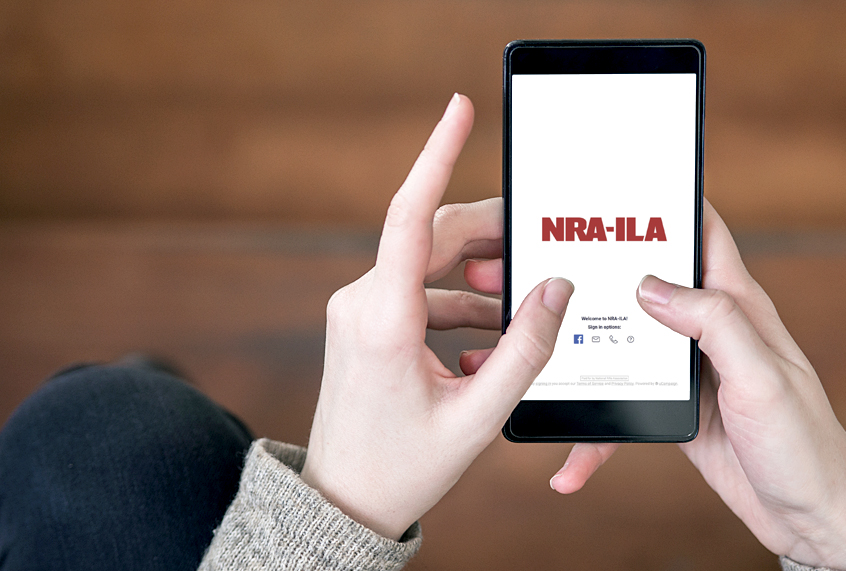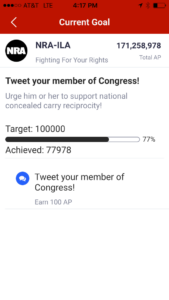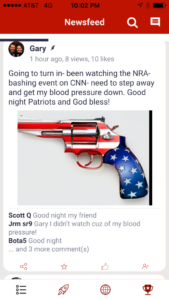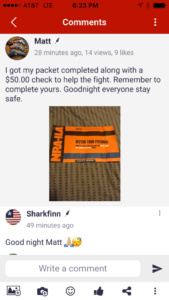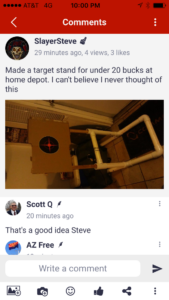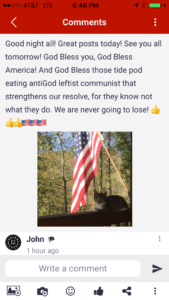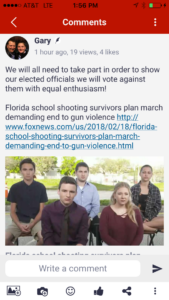If you’re a liberal progressive who wants to rant about the current state of American politics on the internet, you’ll probably head to Facebook and Twitter. The same can be said for the other end of the spectrum, but there’s a more shrouded medium in which many right-wingers congregate privately before bringing their political organizing into the public domain.
Meet the official smartphone app of the NRA-ILA, the acronym for National Rifle Association Institute for Legislative Action — “the ‘lobbying’ arm of the National Rifle Association of America,” in the NRA-ILA’s own words. Upon opening the NRA-ILA’s official app, users are greeted with one important metric: the number of people who have tweeted Congress to support the Concealed Carry Reciprocity Act, paired with a progress bar. As of Friday afternoon, 77,978 users had shared the tweet, “Protect our constitutional right to self-defense; Defend the #2A! #DefendTheSecond!” to their respective lawmakers. The goal is 100,000. The app encourages users to share their zip code, which in return generates their congressperson’s Twitter handle, and then provides a pre-written tweet.
Once tweeted, a task that takes mere seconds, a user earns 100 Action Points — known as AP on the platform. The accumulation of APs enables users to unlock features and receive “badges.” Every user starts out as an “intern,” but eventually the goal is to level up to “founder” status — this can only be achieved through acquiring points, which means sharing NRA-related content, inviting others to join, donating to the NRA, or by joining the organization. The interface itself is slightly clunky by 2018’s standards — it’s no Twitter or Facebook Messenger — but the psychology and gamified aspects behind it are powerful. Indeed, the app has the same sort of addictive qualities that kept users hooked on popular smartphone games like Candy Crush, Pokémon Go or Angry Birds: points, rewards, instant digital accolades, and most importantly, a sense of community. From a scrolling news feed decorated with memes and messages from supporters around the country, to the ability to connect with your local community, it’s easy to see why the app is a success for the NRA.
The app is co-created by uCampaign — the same company that built apps to rally Ted Cruz voters in 2016, support the Brexit movement, and yes, help Trump sail to victory in the 2016 presidential election. uCampaign was founded by Thomas Peters in 2014, but the idea came to him on the evening of Nov. 6, 2012 — when Barack Obama was re-elected as president. This company was his form of vengeance, to bring Republicans back into power.
“I became convinced that night the only way to defeat Democrats was to learn from their tech advances, and then leapfrog them,” Peters explained in a Medium article. “Our goal was to create a new tool that would connect digital and field for a low cost, with measurable results.”
Multiple attempts to contact Peters or a uCampaign representative for this story were unsuccessful. Yet according to Peters’ LinkedIn profile, prior to launching uCampaign he started “The American Papist,” a Catholic blog that he ran for nearly seven years and which eventually moved under the aegis of the organization Catholic Vote. According to a profile of Peters that appeared in the Our Visitor Sunday, he was previously hired to work with the National Organization for Marriage — the same group that staged a rally in New York to protest gay marriage in 2011.
Peters found a developer, and together they created a prototype of the platform to shop around to 2016 GOP presidential candidates. It was a “long-shot,” Peters said on his Medium page, but Chris Wilson, director of Ted Cruz’s polling and analytics department, saw the potential in Peters’ creation.
“Team Cruz chose uCampaign because it would help them put existing data to use and generate new data,” Peters said on Medium. “As a phone app it has authorized access to a supporter’s phone address book contacts. That allows it to match those contacts to Cruz’s voter universes and prompt existing supporters to reach out personally to identified potential supporters.”
The app also gave Cruz supporters a private place to bond.
“Unlike the awkward conversations with uncles and cousins on a Facebook newsfeed, or the perpetual drama of political Twitter, these apps offer a safe space for like-minded supporters of Ted Cruz to interact via the in-app newsfeed,” Peters explained.
Peters credits the app for Cruz’s victory in the 2016 Iowa caucus; Cruz beat Donald Trump by nearly 6,000 votes.
Donald Trump’s 2016 campaign
The Trump 2016 campaign started to use the uCampaign app 74 days before election day. With a little more than two months left to rally Trump supporters, the app had 150,000 downloads with users that performed over 1.2 million actions — and they accessed over 3 million contacts via users. A uCampaign case study that Peters wrote up claims that one activist recruited over 600 personal contacts to join the app.
“The first big action we promoted was asking activists to recruit their friends and family via text and email,” Peters explained in a Medium post about the Trump campaign. “We gave every activist a personal invite code so we could track successful invitations. This encouraged the app to grow virally; they could invite friends not just via email and text, but through their phone’s share-to-other apps function.”
According to a Wired article from September 2016, the Hillary Clinton 2016 app, created by a group of former employees of DreamWorks Animation, Charity: Water and Livestream, had similar engagement metrics; from July to September in 2016 the app had over 100,000 users.
Inside the NRA-ILA app
As Parkland shooting survivors rallied on Twitter and Facebook, demanding gun reform and sparring with impotent lawmakers, supporters of the NRA were doing the same — in a more secluded corner of the internet.
The NRA-ILA app is accessible to anyone who wishes to join it; no money, invite code or NRA membership is required. Yet within the app’s forum, it feels vaguely like you’ve just entered a secret society — especially if your political views aren’t aligned with the majority.
I’ve spent nearly a week lurking around the app, observing how the NRA-ILA app community responds to current events and trying to gain understanding into their passion for weapons. Users regularly snap photos of their guns and post them to the newsfeed, using adjectives that jockeys might use to describe a horse: “beautiful,” “proud,” and so on. Others share photos of teaching their grandchildren and children how to use a gun. They speak with nostalgia of the old days. They castigate their enemies as “libtards” and describe gun control advocates as if they all existed under one umbrella.
As the sun set on Friday night, anonymous users flooded the newsfeed to wish each other a goodnight.
“God bless those tide pod eating antigod leftist communist[s] that strengthen our resolve, for they know not what they do” one user wrote. “We are never going to lose!”
It’s true, times of crisis do bring people together — on both sides. It is hard to gauge how engaged NRA-ILA app users were prior to the shooting at Marjory Stoneman Douglas High School on Valentine’s Day that claimed the lives of 17 people, and which whipped up new fervor on both sides of the gun debate. Yet the NRA-ILA app is very crowded with conversation and posts, and hundreds of new users join each day.
Conversely, the same kind of online, interest group–specific organizing is emerging on the left, though it’s not as prevalent — yet. A group of former Clinton campaigners have banded together to form The Tuesday Company. Their app, Team, “empowers campaigns to expand voter contact by activating the social networks of their volunteers,” in their words. Michael Luciani, the company’s CEO and founder, tells Salon they are working with advocacy groups and campaigns as clients.
The ability of apps like NRA-ILA to increase intensity quickly and easily spread partisan messaging on Twitter and Facebook merely contributes to the sense of confusion over what is “real” and what isn’t on social media. With recent revelations into government-run propaganda campaigns to diffuse and manipulate public opinion on social media, the NRA-ILA’s efforts only further dilute the sense that social media is any kind of gauge whatsoever of the political zeitgeist.
